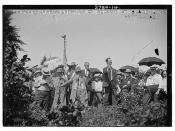Born in Kirkwood, Missouri, Moore studied biology at Bryn Mawr College. After travelling in Europe with her mother, she taught at the U.S. Indian School in Carlisle, Pennsylvania, and later moved to Brooklyn, New York, where she worked as a librarian. Moore first published her poems in such little magazines as the Egoist, Poetry, and Others, later editing the Dial, a highly regarded modernist periodical.
In part because of her extensive European travels before the First World War, Moore came to the attention of poets as diverse as Wallace Stevens, Hilda Doolittle, T. S. Eliot, and Ezra Pound and corresponded for a time with W.H. Auden and Ezra Pound.
In her poetry Moore experimented with the stanza and strived to unite what she called "precision, economy of statement [and] logic" with complex rhyme patterns, syllable counts, and ornate diction. Her volumes include Poems (1921), Observations (1924), Collected Poems (1951), and Complete Poems (1967).
On "Bird-Witted"About the poem:The American poet Marianne Moore wrote poems quite similar to fables in their use of animals and animal traits to comment on human experience. Composed in (1951) and published in her Collected Poems, MooreÃÂs narrative poem Bird-witted can attain the quality of fable as its being a brief allegorical narrative where the characters are animals who act like people while retaining their animal traits.
The poem is about a mother mockingbird struggling to feed its three fledglings or young birds when a cat approaches them to mark the transformation of the mother from a feeding and caring bird to dangerously defending and protective.
The First StanzaMoore chooses animals or birds to replace the existence of the world of man, there is no human but animals working like humans yet keeping their animal traits. Moore constructs in this poem and many other poems, a...


![[Portrait of Wesley Prince, Oscar Moore, and Nat King Cole, Zanzibar, New York, N.Y., ca. July 1946] (LOC)](https://s.writework.com/uploads/1/15882/portrait-wesley-prince-oscar-moore-and-nat-king-cole-zanzib-thumb.jpg)